Add XDP support on a NIC driver
Lorenzo Bianconi
Jesper Dangaard Brouer
Ilias Apalodimas
NetDev 0x14
August 2020
Target audience
- target audience is a kernel developer that wants to extend existing driver to support XDP

XDP technical requirements
Quick introduction to XDP technical requirements
Driver XDP RX-processing (NAPI) loop
Code needed in driver for supporting XDP is fairly simple
while (desc_in_rx_ring && budget_left--) { action = bpf_prog_run_xdp(xdp_prog, xdp_buff); /* helper bpf_redirect_map have set map (and index) via this_cpu_ptr */ switch (action) { case XDP_PASS: break; case XDP_TX: res = driver_local_xmit_xdp_ring(adapter, xdp_buff); break; case XDP_REDIRECT: res = xdp_do_redirect(netdev, xdp_buff, xdp_prog); break; default: bpf_warn_invalid_xdp_action(action); /* fall-through */ case XDP_ABORTED: trace_xdp_exception(netdev, xdp_prog, action); /* fall-through */ case XDP_DROP: page_pool_recycle_direct(pp, page); res = DRV_XDP_CONSUMED; break; } /* left out acting on res */ } /* End of NAPI-poll */ xdp_do_flush_map(); /* Bulk chosen by map, can store xdp_frame's for flushing */ driver_local_XDP_TX_flush();
Tricky part is changing driver memory model to be compatible with XDP
XDP requirements
- XDP frame in physical contiguous memory
- BPF Direct-Access for validating correctness
- No paged frames support, data cannot be split across pages
- Read and Write access to the DMA buffers
- Disable jumbo frames (packet < PAGE_SIZE) loading a BPF program
- XDP headroom for xdp_frame area
- add push/pop header through bpf_xdp_adjust_head()
- Reserve tailroom for skb_shared_info and rely on build_skb() on XDP_PASS
- Cannot allocate page fragments to support it (e.g. through napi_alloc_skb())
- Rx buffers must be recycled to get high speed!
Register your XDP memory model
XDP force drivers to register which memory model they use
- See struct xdp_rxq_info and member “mem” struct xdp_mem_info
- API see:
xdp_rxq_info_reg_mem_model()
- API see:
Advantage: Allows inventing new memory models for networking
MEM_TYPE_PAGE_SHAREDis the normal refcnt based modelMEM_TYPE_PAGE_POOLis optimized for XDP (more on this later)MEM_TYPE_XSK_BUFF_POOLis to AF_XDP zero-copy into userspace- Hope new models will be invented
- e.g. imagine memory used by NIC belongs to GPU graphics card
XDP architecture
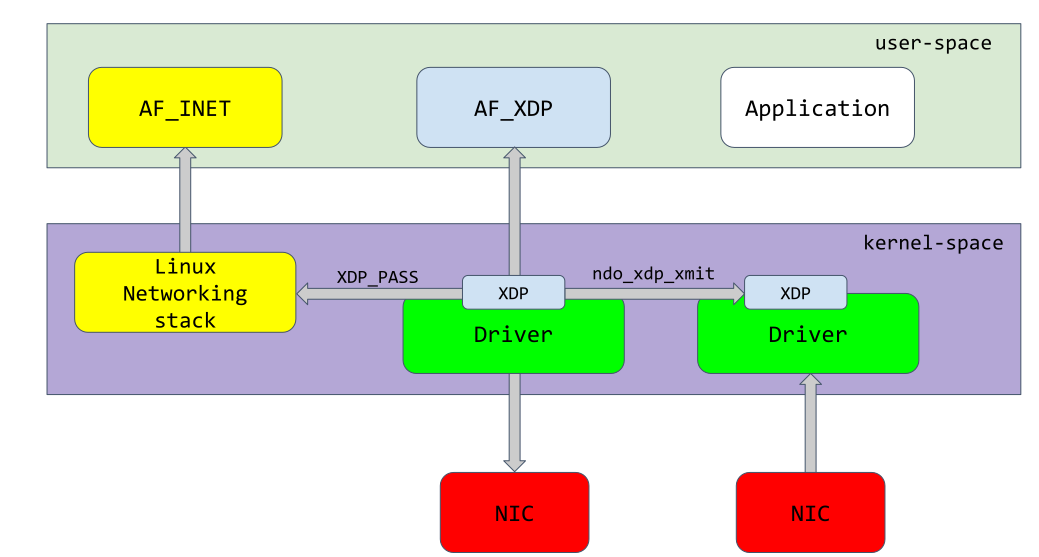
The page_pool allocator
Helping drivers with API to ease transition to new memory model
- page_pool design principles
- page_pool architecture
- page_pool APIs
- code examples
page_pool: design principles
- optimized for XDP memory-model
- ideally one page per frame model
- supports split-page model, but the recycling is usually in-driver
- one page_pool for each hardware rx queue
- run in NAPI context, no locking penalties
- some hw will impose exceptions (i.e. currently cpsw)
- native buffer recycling for XDP
- two caches available
- in-softirq cache
- ptr-ring cache
- two caches available
- API supports DMA mapping and syncing
page_pool: architecture
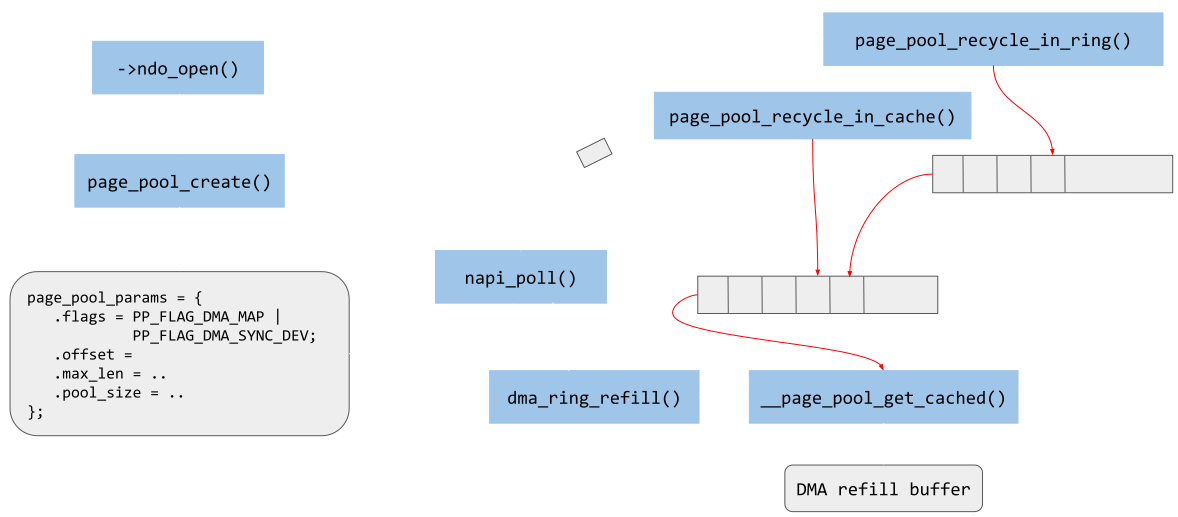
page_pool: APIs
- Main APIs
- page_pool_create(): create the pool object
- page_pool_put_page(): recycle or unmap the page
- page_pool_release_page(): unmap the page
- page_pool_dev_alloc_pages(): get a new page from cache or alloc a new one
- page_pool_get_dma_addr(): retrieve the stored DMA address
- page_pool_get_dma_dir(): retrieve the stored DMA direction
- page_pool_recycle_direct(): recycle the page immediately
- kernel documentation available @ Documentation/networking/page_pool.rst
Code examples (1/2)
- pool registration opening net_device
struct page_pool_params pp_params = { 0 }; struct xdp_rxq_info xdp_rxq; int err; pp_params.order = 0; /* internal DMA mapping in page_pool */ pp_params.flags = PP_FLAG_DMA_MAP; pp_params.pool_size = DESC_NUM; pp_params.nid = NUMA_NO_NODE; pp_params.dev = priv->dev; pp_params.dma_dir = xdp_prog ? DMA_BIDIRECTIONAL : DMA_FROM_DEVICE; page_pool = page_pool_create(&pp_params); err = xdp_rxq_info_reg(&xdp_rxq, ndev, 0); if (err) goto err_out; err = xdp_rxq_info_reg_mem_model(&xdp_rxq, MEM_TYPE_PAGE_POOL, page_pool); if (err) goto err_out;
Code examples (2/2)
- NAPI poller
dma_dir = page_pool_get_dma_dir(dring->page_pool); ... while (done < budget) { if (some error) page_pool_recycle_direct(page_pool, page); if (packet_is_xdp) { if XDP_DROP: page_pool_recycle_direct(page_pool, page); } else (packet_is_skb) { page_pool_release_page(page_pool, page); new_page = page_pool_dev_alloc_pages(page_pool); } }
- module unloading
page_pool_put_page(page_pool, page, false); xdp_rxq_info_unreg(&xdp_rxq);
Add XDP support on a NIC driver: mvneta
- page_pool lifecycle
- create/destroy the pool
- DMA ring refill
- XDP architecture
- XDP main loop
- XDP verdicts
- XDP new features
Marvell ESPRESSObin - mvneta
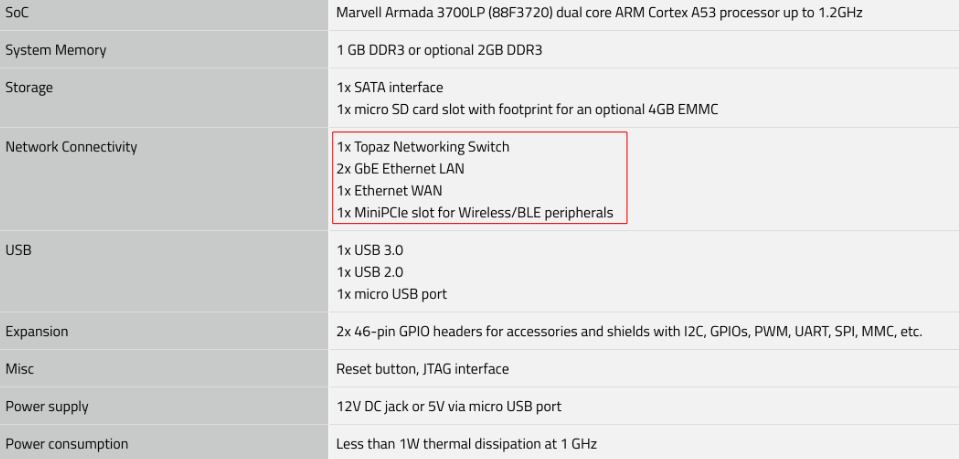
mvneta: page_pool lifecycle (1/3)
- the page_pool is usually associated to a hw rx queue
- the page_pool is created opening or reconfiguring the net_device
int mvneta_create_page_pool(..., struct mvneta_rx_queue *rxq, ...) { struct page_pool_params pp_params = { .order = 0, .flags = PP_FLAG_DMA_MAP | PP_FLAG_DMA_SYNC_DEV, .pool_size = size, .nid = NUMA_NO_NODE, .dma_dir = xdp_prog ? DMA_BIDIRECTIONAL : DMA_FROM_DEVICE, .offset = XDP_PACKET_HEADROOM, .max_len = PAGE_SIZE - SKB_DATA_ALIGN(sizeof(struct skb_shared_info) + XDP_PACKET_HEADROOM), }; rxq->page_pool = page_pool_create(&pp_params); ... xdp_rxq_info_reg(&rxq->xdp_rxq, ..., rxq->id); ... xdp_rxq_info_reg_mem_model(&rxq->xdp_rxq, MEM_TYPE_PAGE_POOL, rxq->page_pool); }
mvneta: page_pool lifecycle (2/3)
- mvneta_rx_refill() relies on page_pool APIs to refill the hw DMA rx ring
- get pages from page_pool caches and avoid the page allocator
- the page is dma_sync_*_for_device() relying on page_pool APIs in page_pool_put_page()
int mvneta_rx_refill(..., struct mvneta_rx_queue *rxq) { dma_addr_t dma_addr; struct page *page; page = page_pool_alloc_pages(rxq->page_pool, gfp_mask | __GFP_NOWARN); if (!page) return -ENOMEM; dma_addr = page_pool_get_dma_addr(page) + XDP_PACKET_HEADROOM; ... rx_desc->buf_phys_addr = dma_addr; rx_desc->buff_addr = page; }
mvneta: page_pool lifecycle (3/3)
- pages allocated to the NIC are released closing the net_device
- pages are released to the page_pool
- the page_pool is destroyed whenever there are no inflight pages
void mvneta_rxq_drop_pkts(..., struct mvneta_rx_queue *rxq) { for (i = 0; i < rxq->size; i++) { ... page_pool_put_full_page(rxq->page_pool, page, false); } if (xdp_rxq_info_is_reg(&rxq->xdp_rxq)) xdp_rxq_info_unreg(&rxq->xdp_rxq); page_pool_destroy(rxq->page_pool); ... }
mvneta: loading an eBPF program
- mvneta_xdp_setup() is used to load or remove an eBPF program from the NIC
- it reconfigures the DMA buffers - XDP memory model
int mvneta_xdp_setup(struct net_device *dev, struct bpf_prog *prog, ...) { bool need_update, running = netif_running(dev); struct bpf_prog *old_prog; if (prog && dev->mtu > MVNETA_MAX_RX_BUF_SIZE) /* no jumbo frames */ return -EOPNOTSUPP; ... need_update = !!pp->xdp_prog != !!prog; if (running && need_update) mvneta_stop(dev); /* remove DMA buffers */ old_prog = xchg(&pp->xdp_prog, prog); ... if (running && need_update) return mvneta_open(dev); /* refill hw DMA ring */ ... }
mvneta XDP architecture
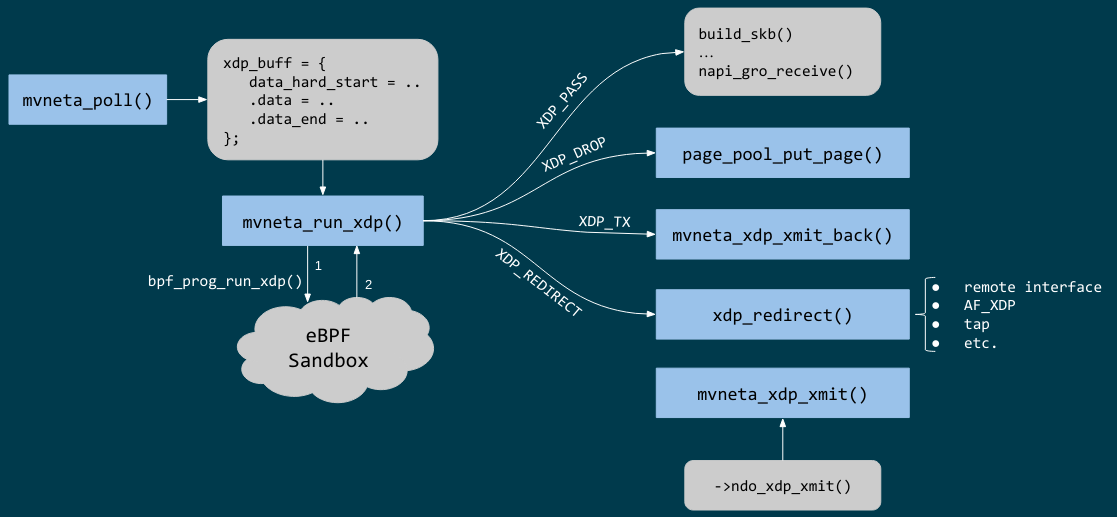
mvneta XDP: main loop - mvneta_rx_swbm()
struct bpf_prog *xdp_prog = READ_ONCE(pp->xdp_prog); struct xdp_buff xdp; for (i = 0, i < budget; i++) { ... if (rx_desc->status & MVNETA_RXD_FIRST_DESC) { /* XDP is single buffer */ enum dma_data_direction dma_dir = page_pool_get_dma_dir(rxq->page_pool); dma_sync_single_for_cpu(..., rx_desc->buf_phys_addr, rx_desc->data_size, dma_dir); /* invalid CPU caches */ ... xdp->data_hard_start = rx_desc->buff_addr; /* init xdp_buff */ xdp->data = rx_desc->buff_addr + XDP_PACKET_HEADROOM + MVNETA_MH_SIZE; xdp->data_end = xdp->data + rx_desc->data_size; ... ret = mvneta_run_xdp(.., xdp_prog, xdp, ...); if (ret != MVNETA_XDP_PASS) goto refill; /* send the packet to the networking stack */ ... refill: mvneta_rx_refill(.., rxq); } }
mvneta XDP: main loop - mvneta_run_xdp()
int mvneta_run_xdp(struct bpf_prog *prog, struct xdp_buff *xdp, ...) { int len = xdp->data_end - xdp->data_hard_start - XDP_PACKET_HEADROOM; int act = bpf_prog_run_xdp(prog, xdp); ... switch (act) { case XDP_PASS: return MVNETA_XDP_PASS; case XDP_REDIRECT: ... xdp_do_redirect(..., xdp, prog); return MVNETA_XDP_REDIR; case XDP_TX: mvneta_xdp_xmit_back(..., xdp); return MVNETA_XDP_TX; case XDP_ABORTED: trace_xdp_exception(..., prog, act); /* fall through */ case XDP_DROP: page_pool_put_page(rxq->page_pool, virt_to_head_page(xdp->data), len, true); return MVNETA_XDP_DROPPED; } }
mvneta XDP: XDP_DROP (1/3)
- the driver is running in NAPI context and page refcount is 1
- page_pool_put_page() will recycle the page in in-softirq page_pool cache
- the page is synced for device using optional size in page_pool_dma_sync_for_device()
int mvneta_run_xdp(struct bpf_prog *prog, struct xdp_buff *xdp, ...) { int len = xdp->data_end - xdp->data_hard_start - rx_offset; int act = bpf_prog_run_xdp(prog, xdp); ... switch (act) { ... case XDP_DROP: page_pool_put_page(rxq->page_pool, virt_to_head_page(xdp->data), len, true); stats->xdp_drop++; return MVNETA_XDP_DROPPED; } }
mvneta XDP: XDP_DROP (2/3)
mvneta XDP: XDP_DROP (3/3)
- DDoS performance:
- packet size: 64B
- DSA: disabled
- XDP_DROP:
$ip link set dev eth0 xdp obj xdp-drop.o
585273 pkt/s
585159 pkt/s
585050 pkt/s
- tc drop:
$tc qdisc add dev eth0 clsact ; tc filter add dev eth0 ingress matchall action gact drop
185237 pkt/s
185557 pkt/s
185670 pkt/s
mvneta XDP: XDP_PASS (1/2)
- XDP_PASS to forward the frame to the networking stack
- mvneta_swbm_rx_frame() relies on build_skb() for zero-copy
- get rid of original copy-break approach
- take into account skb_shared_info in the buffer tailroom
int mvneta_rx_swbm(struct napi_struct *napi, ..., struct mvneta_rx_queue *rxq) { int ret = mvneta_run_xdp(.., xdp_prog, xdp, ...); if (ret != MVNETA_XDP_PASS) goto refill; skb = build_skb(xdp->data_hard_start, PAGE_SIZE); ... /* the page is leaving the pool */ page_pool_release_page(rxq->page_pool, rx_desc->buff_addr); skb_reserve(skb, xdp->data - xdp->data_hard_start); skb_put(rxq->skb, xdp->data_end - xdp->data); /* may be changed by bpf */ napi_gro_receive(napi, skb); refill: ... }
mvneta XDP: XDP_PASS (2/2)
mvneta XDP: XDP_TX (1/3)
- XDP_TX = frame transmitted back out interface where packet was received
- no need to DMA remap the page, only to DMA-sync/flush CPU caches
int mvneta_xdp_xmit_back(..., struct xdp_buff *xdp) { struct xdp_frame *xdpf = convert_to_xdp_frame(xdp); struct page *page = virt_to_page(xdpf->data); dma_addr_t dma_addr; dma_addr = page_pool_get_dma_addr(page) + sizeof(*xdpf) + xdpf->headroom; dma_sync_single_for_device(..., dma_addr, xdpf->len, DMA_BIDIRECTIONAL); tx_desc->buf_phys_addr = dma_addr; tx_desc->data_size = xdpf->len; /* update DMA tx registers */ ... }
mvneta XDP: XDP_TX (2/3) - ssh-mirror.c
- swap ethernet and ip addresses for ssh connections
- by Matteo Croce <mcroce@microsoft.com>
int xdp_main(struct xdp_md *ctx) { struct ethhdr *eth = data; struct iphdr *iph = (struct iphdr *)(eth + 1); struct tcphdr *tcph = (struct tcphdr *)(iph + 1); ... if (tcph->dest == ntohs(22) || tcph->source == ntohs(22)) { memcpy(teth, eth->h_dest, ETH_ALEN); memcpy(eth->h_dest, eth->h_source, ETH_ALEN); memcpy(eth->h_source, &teth, ETH_ALEN); tip = iph->daddr; iph->daddr = iph->saddr; iph->saddr = tip; return XDP_TX; } ... }
mvneta XDP: XDP_TX (3/3)
mvneta XDP: XDP_REDIRECT (1/3)
- xdp_do_redirect() forwards the frame to:
- remote interface - ndo_xdp_xmit()
- remote cpu - cpu_map
- AF_XDP socket
int mvneta_run_xdp(struct bpf_prog *prog, struct xdp_buff *xdp, ...) { int act = bpf_prog_run_xdp(prog, xdp); ... switch (act) { ... case XDP_REDIRECT: xdp_do_redirect(..., xdp, prog); ... stats->xdp_redirect++; return MVNETA_XDP_REDIR; } }
mvneta XDP: XDP_REDIRECT (2/3)
- mvneta_xdp_xmit() - mvneta is the destination of XDP_REDIRECT
- the page is mapped to DMA hw tx ring
int mvneta_xdp_xmit(struct net_device *dev, int num_frame, struct xdp_frame **frames, u32 flags) { ... for (i = 0; i < num_frame; i++) { struct xdp_frame *xdpf = frames[i]; dma_addr_t dma_addr = dma_map_single(.., xdpf->data, xdpf->len, DMA_TO_DEVICE); ... tx_desc->buf_phys_addr = dma_addr; tx_desc->data_size = xdpf->len; } if (flags & XDP_XMIT_FLUSH) { /* update DMA tx registers */ } ... }
mvneta XDP: XDP_REDIRECT (3/3)
mvneta sw RPS: CPUMAP (1/4)
- ESPRESSObin does not support hw Receive Packet Steering (RPS)
- all the packets are received on cpu0
- With CPUMAPs we can move the processing on a remote cpu
- CPUMAPs are used to build the skb and forward it to legacy stack
- We extended CPUMAPs to execute an eBPF program on a remote cpu
- we can now attach an eBPF program on CPUMAP entries
- XDP_REDIRECT and CPUMAP: sw RPS
- on cpu0 mvneta performs XDP_REDIRECT on a CPUMAP entry
- on the remote cpu we run an eBPF program
- e.g. XDP_REDIRECT to another device
mvneta sw RPS: CPUMAP (2/4)
- kthread bound to run on the remote CPU
int cpu_map_kthread_run(void *data) { n = __ptr_ring_consume_batched(); /* consume redirected frames */ ... for (i = 0; i < n; i++) { ... act = bpf_prog_run_xdp(rcpu->prog, &xdp); switch (act) { case XDP_PASS: skb = build_skb_around(); ... case XDP_REDIRECT: ... case XDP_DROP: xdp_return_frame(xdpf); ... } } }
mvneta sw RPS: CPUMAP (3/4)
mvneta sw RPS: CPUMAP (4/4)
mvneta XDP stats
- proper stats accounting is essential for XDP success
- allow the sys-admin to understand what is going on
- netdev stats:
- always increment rx packets counters even for XDP_DROP
- fine grained stats through ethtool
root@espresso-bin:~# ethtool -S eth0 | grep xdp
rx_xdp_redirect: 0
rx_xdp_pass: 0
rx_xdp_drop: 0
rx_xdp_tx: 0
rx_xdp_tx_errors: 0
tx_xdp_xmit: 0
tx_xdp_xmit_errors: 0
- even stats name matters!!
XDP multi-buffers
Work-in-progress
- Adding XDP multi-buffers support
- Design document under XDP-project
Joint work between Amazon and Red Hat
- Future credit to:
- Samih Jubran, Lorenzo Bianconi, Eelco Chaudron
Multi-buffers support for XDP (1/4)
- XDP multi-buffer use cases
- Jumbo frames, TSO, LRO, Packet header split
- Handling GRO SKBs in veth/cpumap/generic-XDP
- How to satisfy eBPF Direct-Access (DA) design?
- Proposal: eBPF can access only to the first packet buffer
- Storage space for multi-buffer segments references
- (like skb_shared_info) at the end of the first segment (in tailroom)
- This “xdp_shared_info” area provide metadata
- for-each buffer: page-pointer, offset, length (see skb_frag_t frags[])
- also metadata for e.g. number of segments, full packet length
- Only need single “mb” (multi_buffer) bit indicator in xdp_buff and xdp_md
- Storage space for multi-buffer segments references
Multi-buffers support for XDP (2/4)
- Modify drivers rx NAPI loop
- Process all RX descriptor segments building xdp_buff
mvneta_swbm_rx_frame()mvneta_swbm_add_rx_fragment()
- Run the eBPF program when all descriptors are processed
- Change XDP_TX and ndo_xdp_xmit to map non-linear buffers
mvneta_xdp_submit_frame()
- Remove MTU check loading the eBPF program
mvneta_xdp_setup()
- Process all RX descriptor segments building xdp_buff
Multi-buffers support for XDP (3/4)
(mvneta) Multi-buffers support for XDP (4/4)
void mvneta_swbm_add_rx_fragment(struct xdp_buff *xdp, ...) { struct skb_shared_info *sinfo = xdp_get_shared_info_from_buff(xdp); ... if (data_len > 0 && sinfo->nr_frags < MAX_SKB_FRAGS) { skb_frag_t *frag = &sinfo->frags[sinfo->nr_frags++]; skb_frag_off_set(frag, offset); skb_frag_size_set(frag, data_len); __skb_frag_set_page(frag, page); } } struct sk_buff *mvneta_swbm_build_skb(struct xdp_buff *xdp, ..) { struct skb_shared_info *sinfo = xdp_get_shared_info_from_buff(xdp); ... skb = build_skb(xdp->data_hard_start, PAGE_SIZE); memcpy(frags, sinfo->frags, sizeof(skb_frag_t) * num_frags); for (i = 0; i < num_frags; i++) { skb_add_rx_frag(skb, skb_shinfo(skb)->nr_frags, page, skb_frag_off(frag), skb_frag_size(frag), PAGE_SIZE); page_pool_release_page(..., page); } }
How to test a XDP driver
- XDP_PASS
- XDP_DROP
- XDP_TX
- XDP_REDIRECT
- ndo_xdp_xmit
test a XDP driver (1/4)
- XDP_PASS:
- load a program that returns XDP_PASS on the host
- verify the packets are delivered to the networking stack
- load a program that returns XDP_PASS on the host
- XDP_DROP:
- load a program that returns XDP_DROP on the host
- verify traffic is dropped
- load a program that returns XDP_DROP on the host
make M=samples/bpf -j24 sudo ./samples/bpf/xdp1 eth0 proto 17: 324874 pkt/s proto 17: 324557 pkt/s proto 17: 324650 pkt/s sudo ./pktgen_sample02_multiqueue.sh -i enp2s0 -d 192.168.200.1 -s 64 \ -m e0:d5:5e:65:ac:83 -t4 -n0
test a XDP driver: XDP_TX (2/4)
- load a program that returns XDP_TX on the host
make M=samples/bpf -j24
sudo ./samples/bpf/xdp2 eth0
proto 17: 55231 pkt/s
proto 17: 55971 pkt/s
proto 17: 55617 pkt/s
proto 17: 55103 pkt/s
- send a specific amount of packets to the host and capture the re-injected traffic with wireshark/tcpdump
sudo tcpdump -ni enp2s0 -s0 -w test.pcap for i in {1..1500000}; do echo "This is my data" > /dev/udp/192.168.200.1/3000; done
- open the trace and verify packets are correctly received (1500000 Rx packets)
test a XDP driver: XDP_REDIRECT (3/4)
- redirect packets to an AF_XDP socket
make M=samples/bpf -j24
sudo ./samples/bpf/xdpsock -i eth0
sock0@eth0:0 rxdrop
pps pkts 1.00
rx 324,596 869,646
tx 0 0
sock0@eth0:0 rxdrop
pps pkts 1.00
rx 324,235 1,194,260
tx 0 0
- start sending traffic to that interface
sudo ./pktgen_sample02_multiqueue.sh -i enp2s0 -d 192.168.200.1 -s 64 \
-m e0:d5:5e:65:ac:83 -t4 -n0
test XDP: ndo_xdp_xmit (4/4)
- create a veth pair and move one peer to a “remote” namespace
ip netns add remote ip link add v0 type veth peer name v1 netns remote
- run xdp_redirect sample from kernel tree to redirect traffic from v0 to eth0
- start sending traffic from v1
make M=samples/bpf -j24
sudo ./samples/bpf/xdp_redirect v0 eth0
- start injecting traffic into v1
- check outgoing traffic from eth0 with wireshark/tcpdump
Q&A:

